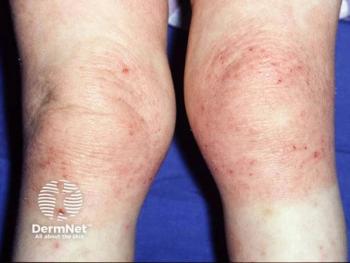
More trials for pediatric dermatitis
FDA approves early, pre-approval trials for pediatric cases
Children with atopic dermatitis present with remarkable variation in disease severity. One of the challenges for dermatologists managing this disease in kids is adequately treating severity, says Lawrence F. Eichenfield, M.D., in a talk given on June 23 at the 14th annual Women’s and Pediatric Dermatology Seminar in Newport Beach, Calif.
“With more significant disease, there’s a tremendous amount of burden in terms of symptoms, rash, secondary medical consequences and increasing data of comorbidities,” said Dr. Eichenfield, who is chief of pediatric and adolescent dermatology, University of California San Diego and Rady Children’s Hospital, San Diego.
Among the secondary medical consequences of pediatric atopic dermatitis: Cutaneous and, sometimes, systemic infections, sleep disturbance, and neuropsychologic effects, including anxiety, depression and attention deficit hyperactivity disorder (ADHD). Children with atopic dermatitis are more likely than those without the disease to suffer from a range of comorbidities, including traditional atopic comorbidities, such as asthma, allergic rhinitis, food allergy and contact allergy.
“There’s increasing cardiovascular evidence in adults, but we haven’t seen that yet in kids with atopic dermatitis,” he said.
Dermatologists are seeing what Dr. Eichenfield called the revolutionary phase for pediatric atopic dermatitis management. After a 15-year lull, the Food and Drug Administration approved the topical phosphodiesterase 4 (PDE-4) inhibitor crisaborole (Eucrisa, Pfizer) in December 2016. Regeneron Pharmaceuticals and Sanofi recently released phase 3 data on the use of the monoclonal antibody dupilumab (Dupixent) for patients 12 to 17 years with moderate-to-severe atopic dermatitis. The FDA approved dupilumab for adults with the disease in March 2017.
“There’s a good chance dupilumab will be approved within the next six to nine months in adolescents,” he said. “There are another 20-plus drugs in development for atopic dermatitis.
Dermatologists have helped to lobby for faster drug approvals for pediatric atopic dermatitis patients and, it appears, the FDA has listened, according to Dr. Eichenfield. The
REFERENCE
Eichenfield LF. Atopic Dermatitis: Pediatric Challenges. 14th Annual Women’s & Pediatric Dermatology Seminar. Newport Beach, Calif., June 22 and 23, 2018.
Newsletter
Like what you’re reading? Subscribe to Dermatology Times for weekly updates on therapies, innovations, and real-world practice tips.











